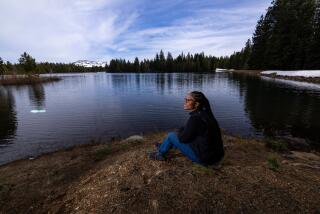Black Accepted by Shoal Creek; Protest Curbed
- Share via
BIRMINGHAM, Ala. — Six weeks after founder Hall Thompson declared his all-white country club immune to outside racial pressures, the Shoal Creek board of governors reluctantly welcomed a black to its membership Tuesday and began processing the application of one other black, thus averting a planned protest of the upcoming PGA Championship.
The agreement, which was announced in the Birmingham city council chambers by Mayor Richard Arrington, ended a series of tense negotiations between representatives of Shoal Creek, the PGA of America and the Southern Christian Leadership Conference. The SCLC had vowed to set up picket lines at the country club unless, among other demands, a black was invited to join Shoal Creek before the beginning of the Aug. 9-12 tournament.
Embarrassed by public outcry, pressured by both the PGA of America and the SCLC and stung by the defections of national television advertisers, Shoal Creek its first black member in its 13 years of existence. An honorary membership was extended to and accepted by Louis J. Willie, president of a local insurance agency.
Willie is familiar with such controversies. He was the first black member of The Club and The Downtown Club, two exclusive Birmingham business organizations. When contacted Monday by Arrington about accepting Shoal Creek’s offer, Willie said he didn’t hesitate.
“I made my decision while I was on the phone,” he said.
By granting an honorary membership, Shoal Creek spared Willie the cost of its $35,000 initiation fee and an application process that takes as long as six months. More to the point, Shoal Creek also spared itself picket lines and more bad publicity.
“The actions of the board are consistent with the stated membership policies and bylaws of Shoal Creek,” said John Pittman, president of the club’s board of directors. “The Board felt it was in the best interest of all involved to expand our minority membership.”
Pressed further about the circumstances involving Willie’s selection, Pittman chose understatement.
“Let us just say we thought the time was right for us to make a decision at this time,” he said.
Willie has full access to the club and its facilities, but there remains some question about his ability to nominate potential candidates for membership. Pittman said Tuesday he was unsure if it took “one or two” members to offer someone for club consideration.
As expected, the SCLC’s choices for membership--Birmingham attorney Donald Watkins and public accountant Jim White--were not extended invitations. And while Pittman said it was against club policy to reveal the names of prospective members, a source familiar with Shoal Creek revealed that neither Watkins nor White was the other black whose application was currently being processed.
Still, SCLC leaders seemed less concerned with names than with numbers. Not only did Joseph E. Lowery, SCLC national president, and Birmingham chapter president Rev. Abraham Woods want a black member before the tournament’s beginning, they also wanted a black to be included in the normal interview process. Both conditions were met.
“We asked that two prominent businessmen (Watkins and White) . . . be asked,” Woods said, “but we’re not choosy about that. We understand that the process has been started.”
Woods also said that he has received assurances from Pittman that the application process might be expedited, from six months to three.
Shoal Creek wasn’t the only one that was forced to examine its practices. The agreement also requires the PGA of America to recommend to its board of directors that future PGA Championships be played at clubs with non-exclusionary membership rules. Jim Awtrey, chief executive officer of the PGA of America, said the proposal will be ratified next Wednesday and that a new policy will be announced at that time.
If so, then at least two of the four announced championship sites could be affected by the new mandate.
According to an official of the Aronimink Golf Club, near Philadelphia, site of the 1993 PGA Championship, an unwritten policy of discrimination similar to that of Shoal Creek’s exists. There also are no black members at Crooke Stick Golf Club in Carmel, Ind., site of next year’s championship; at Bellerive Country Club in St. Louis, site of the 1992 event, and at Oak Tree Golf Club in Edmund, Okla., site of the 1994 tournament. Oak Tree also doesn’t include women as members.
On Tuesday, Awtrey only would say that discussions with those four clubs were ongoing.
Awtrey also told Lowery that the PGA of America would be willing to discuss possible programs aimed at improving black participation in the game, as well as the business of golf. Lowery wants to see more blacks involved in every aspect of sport, from the PGA Tour to the various golf administrative staffs.
Similar meetings are expected to take place with representatives of the PGA Tour.
“We consider this equally important,” Lowery said.
Still to be determined is the impact of Shoal Creek’s new policy on those advertisers who canceled or reduced their commercial participation in ABC and ESPN tournament broadcasts. At last count, Toyota and IBM had pulled its ads, while Delta had curtailed the number of commercials it will air.
“We called ABC and told them that the controversy had been resolved,” said Joe Steranka, senior director of marketing and promotions for the PGA of America.
Steranka said he doesn’t know if the three advertisers will now reconsider their decisions.
More to Read
Go beyond the scoreboard
Get the latest on L.A.'s teams in the daily Sports Report newsletter.
You may occasionally receive promotional content from the Los Angeles Times.










